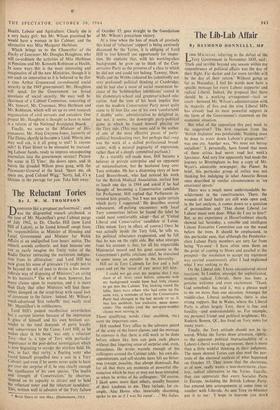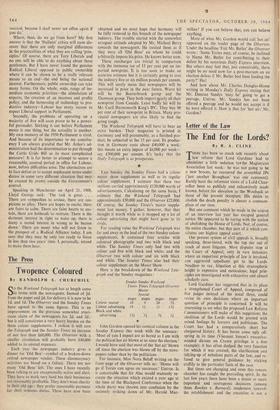The Lib-Lab Affair
By DESMOND DONNELLY, MP
ORD MACAULAY, referring to the defeat of the Tory Government in November 1830, said:
'Dark and terrible beyond any season within my remembrance of political affairs was the day of their flight. Far darker and far more terrible will be the day of their return.' Without going as far as Macaulay, I feel his words now have a specific message for every Labour supporter and
radical Liberal. Indeed, the proposal that there should be a working arrangement--tacit or overt—between Mr. Wilson's administration with its majority of five and the nine Liberal MPs has already had its most powerful support in the form of the Government's statement on the economic situation.
But what of the opposition this past week to the suggestion? The first reaction from the 'British Stalinists' was predictable. 'Nothing must be done to water down Labour's programme!' was one cry. Another was, 'We must not betray socialism!' I, personally, have found that most of these critics had never read last week's Spectator. And very few apparently had made the journey to Birmingham to buy a copy of Mr. Wyatt's admirable newspaper, the Planet. In brief, this particular group of critics was not thinking but indulging in what Aneurin Bevan once described in similar circumstances as 'an emotional spasm.'
There was a much more understandable be- wilderment in the constituencies. There, the wounds of local battle are still wide open and, in the last analysis, it conies down to a question of personalities and 'That damn Liberal (or Labour man) next door. What do I say to him?' But, as my experience at Haverfordwest clearly showed last Saturday, a sensible and intelligent Labour Executive Committee can see the wood before the trees. It should be emphasised, in this particular case, that although the Pembroke- shire Labour Party members are very far from being 'Yes-men'--I have often seen them on the point of coming to blows and quailed at the prospect the resolution to accept my statement was carried unanimously after 1 had explained what I was seeking to do.
On the Liberal side, 1 have encountered mixed reactions. In London, amongst the sophisticated, modern radical Liberals, there has been a genuine welcome and even excitement. 'Thank God somebody has said it,' was a phrase used to me on more than one occasion. Amongst the middle-class Liberal technocrats, there is also strong support. But in Wales, where the Liberal Party is often largely Tory, there is fear and hostility---and understandably so. For example, my personal friend and political neighbour, Mr. Roderic Bowen, QC, has lived on Tory votes for many years.
Finally, the Tory attitude should not be ig- nored. Whilst the Tories draw attention, rightly, to the apparent political impracticability of a Labour-Liberal working agreement, there is more than a little wishful thinking in their judgment. The more shrewd Tories can also read the por- tents of the electoral analysis of what happened on October 15. They know that the electorate, as of now, really wants a non-doctrinaire, class- less, radical alternative to the Tories. Equally, they can appreciate that every Socialist Party- in Europe, including the British Labour. Party, has entered into arrangements at some time or another with Liberals. As one Tory ex-Minister put it to me: ,'I hope to heavens you don't
succeed, because I shall never see office again if you do.'
Where, then, do we go from here? My first answer is that the 'Stalinist' critics will soon dis- cover that there are only marginal differences in the practicalities of what they are calling 'prin- ciples.' Of course, there are Tory Liberals and no one will be able to do anything about these gentlemen. But I have never found the genuine Radical Liberal opposed to public ownership where it can be shown to be a really relevant means to an end—the end being the national interest. Furthermore, public ownership can take many forms. On the whole, wide, range of im- mediate economic priorities—the stimulation of exports, the creation of an incomes and profits policy, and the harnessing of technology to pro- ductive industry—Labour has every reason to expect Liberal support in Parliament.
Secondly, the problems of operating on a majority of five will soon prove to be a power- ful persuader. Sticking it out before Parliament meets is one thing, but the actuality is another. My own memory of the 1950 Parliament is vivid. And because of its importance to my constitu- ency I am always grateful that Mr. Attlee's ad- ministration had the determination to put through the Cattle Grids Bill as its most complicated measure! It is far better to attempt to secure a reasonable, assured period in office for Labour, now, before difficulties arise. The alternatives are to face defeat or to accept unpleasant terms under duress in some very different situation that may be created by events outside the Government's control.
Speaking in Manchester on April 21, 1908, Lloyd George said : 'The task is great. . . . There are sympathies to arouse, there are sus- picions to allay. There are hopes to excite, there are fears to calm. There are faint hearts to sus- tain, there are hotheads to restrain. There is the dormant interest in right to wake up, there is many a vested interest in wrong to be beaten down.' There are many who will not listen to the prospect of a Radical Alliance today. I am sure that they may be only too ready to listen in less than two years' time. I, personally, intend to make them hear.



































 Previous page
Previous page